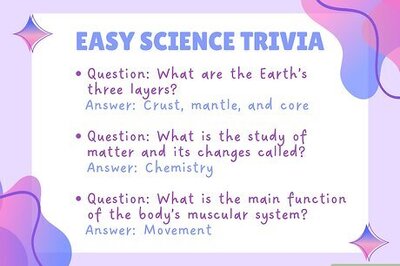
views
- An extramarital affair occurs when one spouse breaks the marital vows set by the couple by secretly having a relationship with someone other than their spouse.
- There are several different types of affairs, including physical, emotional, romantic, casual, and accidental.
- A spouse might have an extramarital affair because of relationship or self-dissatisfaction, love or sex addiction, entitlement, or revenge.
What is an extramarital affair?

An extramarital affair violates a married couple's vows. In a traditional monogamous marriage, an extramarital affair occurs when one spouse has a sexual relationship with someone else who isn't their spouse. In other types of marital relationships, what is considered an affair depends on the boundaries the couple has set. The hallmark of an affair is that the spouse who's having the outside relationship lies about that relationship or keeps it secret from their spouse. A spouse can have an affair even in an open or polyamorous relationship if they violate the terms the couple agreed on or keep the relationship a secret. Marriage and family therapist Moshe Ratson notes that this betrayal can be a devastating experience for the spouse cheated on, creating an "unstable emotional state that can at times be described as a roller coaster of emotions."
Types of Extramarital Affairs

Physical affair A physical or sexual affair is most people's primary understanding of an affair. It typically involves a spouse having sexual relations with a person who isn't their spouse. The cheating spouse may or may not have feelings for the person they're having an affair with. A physical affair is an ongoing, regular thing. This distinguishes it from casual or accidental affairs, although a physical affair can start out as casual or accidental.

Emotional affair An emotional affair typically occurs when a spouse has a deep or intense emotional connection with someone other than their spouse. The two often commiserate with each other and may discuss issues that they don't discuss with their spouse. For example, a spouse having an emotional affair might talk to this other person about problems they have with their spouse that they've never mentioned directly to their spouse. Some consider falling in love with another person an emotional affair but many would categorize that as a romantic affair.

Romantic affair A romantic affair is typically a full-blown relationship in which the spouse has completely fallen in love with the person they're having an affair with. They might even contemplate leaving their spouse to be with this other person. A romantic affair can be the most troubling and difficult to get past, especially in traditionally monogamous marriages.

Casual affair A casual affair typically doesn't involve any emotional attachment—only occasional sexual activity. The person the spouse is having an affair with is often someone they already know pretty well, such as a friend or coworker. The two have no interest or intention of ever being a couple. Often, the cheating spouse will use the casual nature of the affair to disregard it or claim that it wasn't "really" cheating because feelings weren't involved. Some casual affairs come about because the spouse is exploring their sexuality or experimenting with things they didn't have a chance to do before they got married.

Accidental affair No affair is ever truly accidental, but in this case, the affair wasn't planned in advance or premeditated—it just sort of happened. This is something that's more likely to happen between two people who were already relatively close. Accidental affairs are typically only one-night stands, although they might occasionally happen more than once. An accidental affair is more likely if the two people are in a situation where alcohol is involved or if they're far from home, such as two work colleagues attending a convention.
Causes of Extramarital Affairs

Relationship dissatisfaction One of the most common reasons for an affair is that one spouse is dissatisfied with the relationship they have with the other spouse. This could mean that their needs aren't being met in the relationship or that the couple is constantly fighting with each other. An emotional affair typically arises when a spouse's emotional needs aren't being met. For example, they might feel like they're ignored or that their spouse cares more about the children's needs than theirs. Often there's also a communication breakdown, although it could be that the cheating spouse has brought up their issues and felt slighted or ignored when they did.

Personal dissatisfaction Sometimes an affair happens because a spouse has low self-esteem or is feeling down about themselves and their spouse can't make them feel better. A new love interest who compliments them constantly can make them feel better about themselves—at least for a little while. The stereotype here is the older man who cheats on his wife with a much younger woman—his ego is flattered that a younger woman would want to be with him. This motivation can lead to an affair regardless of the cheating spouse's gender, though. Having someone you find attractive pay attention to you is an ego boost for anyone.

Love addiction When someone begins a romantic relationship, their body produces an excessive amount of feel-good chemicals and hormones. We associate those feelings with falling in love, and some people are addicted to that feeling. That addiction can cause them to constantly seek out new relationships. The spouse who cheats because they're addicted to love will likely have more than one affair. Love addiction affairs are typically short-lived because as soon as that new relationship energy wears off, they'll be ready to move on to someone else.

Sex addiction Someone who is addicted to sex will typically have an affair because they feel as though they're not getting enough sex from their spouse. Even if the couple is having sex quite frequently, that still might not be enough for the sex addict. There is also some thrill-seeking associated with sex addiction. A sex-addicted spouse who cheats might also get something from the riskiness of the act or the threat of getting caught. Even absent sex addiction, someone with a high sex drive could be unfulfilled when married to someone with a low sex drive, which could lead them to step out.

Entitlement Some people feel as though they have the right to enjoy sex with anyone who offers it, regardless of whether they're married. Having an affair out of a sense of entitlement is usually more of a physical, sexual affair. A spouse who has an affair out of entitlement typically will do it again if the opportunity presents itself. They might also believe they won't get caught. Short of feeling entitled, some spouses have an affair simply because the opportunity arises and they worry they'd regret not taking that opportunity.

Revenge Sometimes a spouse will have an affair because they actually want to hurt their partner. This cheating spouse feels wronged in some way and wants their partner to feel the pain that they feel. If a spouse has an affair motivated by revenge, they typically want to get caught, because they won't have their revenge unless their partner discovers the affair. Using an affair as an exit strategy is a related motivation. If a spouse is afraid to end the marriage for whatever reason, they might have an affair to force their partner to end it.
Warning Signs of a Possible Affair

Your spouse puts more effort into their physical appearance. Has your spouse suddenly started wearing more stylish clothes or going to the gym more often? Are they obsessing about how they look? It's possible that they're having an affair. This warning sign alone is not enough to be certain that your spouse is having an affair, but it's pretty meaningful when combined with several other warning signs.

Your spouse becomes more secretive. This warning sign particularly applies to computers and electronic devices. If they've changed the password on their phone or they clear the browser cache after using a shared computer, that's a pretty good sign that they're at least trying to hide something from you. Ask your spouse why they're suddenly being secretive. When they answer, pay attention to their body language as well as the words they say. For example, closed body language or crossed arms could indicate that they're still not being open with you.

Your spouse's schedule has significantly changed. The stereotypical change is that your spouse starts working late several days a week. But they might also start leaving for work earlier or work different days than they did before. Pay attention to how your spouse acts at home as well. Has their routine changed? For example, they might immediately take a shower before interacting with you. Try talking to your spouse about work and see how they respond. For example, you might ask what project they're working on that has them working overtime.

Your spouse is emotionally distant from you. When someone is having an affair, they tend to be a bit distracted from their usual relationships and daily life. If you find that your spouse seems disconnected from you or is uninterested in talking to you on more than a superficial level, they might be having an affair. Keep in mind that there are other reasons your spouse might be emotionally distant, none of which are particularly great for your relationship. To address this issue, you might say, "You seem a little distant lately. Is there something going on that you'd like to talk about?"

There has been a drastic change in your sex life. If your spouse is having a physical affair, they might become uninterested in getting intimate with you. On the other hand, they also might become more interested in getting intimate. Regardless, their attitude toward sex with you is much different than it normally would be. They might also suggest doing things in bed that the two of you haven't done before. Experimenting sexually isn't necessarily a sign of an affair, but it could mean that they've tried different things with someone else.

There are strange or unexplained new expenses. If you and your spouse have a joint bank account, weird expenses could indicate that your spouse is stepping out on you. Typically, they're not going to make those expenses super obvious, but you might look for things like multiple ATM withdrawals. If your spouse really doesn't want to get caught, they might open up a separate credit card in their name only so you can't see an itemized list of expenses. Payment to that card from the joint bank account would also be a clue. You could ask your spouse about any expenses that look odd to you, but keep in mind that if they don't want to get caught they'll just find another way to hide those expenses.
Healing from an Extramarital Affair

Find out the truth about what happened. If you merely suspect that your spouse is cheating on you, that suspicion could potentially do as much damage to your relationship as an actual affair. Psychotherapist Kelli Miller agrees that this is "a good time to evaluate and talk to your spouse and try to feel more connected." Marriage and family therapist Allen Wagner agrees that "the best thing to do is confront them directly, ask them what's going on, if there's an issue." Even if it turns out your spouse isn't having an affair, the fact that you suspected them indicates that there's something missing within your relationship. If it turns out your spouse was having an affair, there's still hope. According to Miller, "cheating doesn't signify the end of a relationship. Yes, it's painful, and it can signify the end but it can also be a really beautiful new beginning."

Talk to your spouse about going to a couples therapist. While it's possible that you could start the healing process on your own, it's much more productive to work with a couples therapist. They can mediate between the two of you and help you resolve the issues in your relationship. Clinical psychologist Supatra Tovar agrees that "sometimes the most helpful thing you both can do is seek counseling together. Understanding what both of you did to contribute to the infidelity can help you find ways to rebuild the trust that was broken." If your spouse isn't interested in going to a couples therapist, don't push it. Therapy likely won't be effective if your spouse feels as though they're forced to be there. Individual therapy can be beneficial for both of you as well, in addition to couples therapy.

Seek support from trusted friends and family. You don't have to go through this process alone. While therapy can certainly help, there's nothing quite like the emotional support you get from friends and family who love you. Let them know what has happened and that you would appreciate their love and support as you heal.

Create a plan to rebuild trust in your relationship. Acknowledge that you can't trust your partner after the affair—that's totally normal. If the two of you can work together, though, it's possible to overcome your hurt and come out of that situation even stronger than you were before. Here are some things you might try: Make sure your spouse has ended the affair completely and cut off all contact with the other person. Accept your spouse's apology, forgive them, and work with them to understand the reasons for the betrayal. Talk about your issues rather than sweep them under the rug. Commit to being open and honest with each other.

Increase the positives in your relationship. In some ways, this is a bit like saying that you're going to "fake it till you make it." If you've decided to try to stay together, forgive your spouse and focus on making your relationship a happy and loving one. Here are some things you can try: Smile at your spouse when you enter the room they're in. Talk about what you like about your spouse and encourage them to do the same for you. Agree with your spouse whenever you can. Spend time working on small projects together as a team, such as a cooperative board game or a jigsaw puzzle.

Focus on taking care of yourself. Self-care is super important in the wake of an affair. It's totally normal to feel rejected and for your self-esteem to take a hit. Set goals for yourself and focus on your own physical and mental health. You might try meditation to help you restore your mental balance and sense of calm. Exercise is also a good thing to build up feel-good chemicals in your body that will help you move on from the pain and trauma. Psychotherapist Kelli Miller recommends "looking at this as an opportunity for growth in yourself." She continues that "this is an inside job that you're going to have to do on your own as far as validating yourself to feel good again."

End the relationship if you feel that's the right decision. Clinical psychologist Supatra Tovar notes that "if you feel strongly that the trust is broken forever, sometimes the best thing you can do is walk away." Tovar suggests that the two of you separate for a brief period so you can figure out what the best course of action might be. This can be a tremendously difficult decision, and it's one that the two of you need to take some time to think about, both apart and together. At this point, it's more important than ever for the two of you to be open and honest with each other. As Tovar emphasizes, "communication is key to a conflict-free separation."




















Comments
0 comment